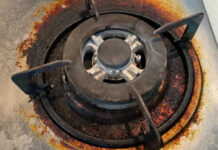There are times when you should turn off your car’s air conditioning. These situations include the following:
Just Before Turning Off the Engine
In reality, turning the car’s air conditioning on or off doesn’t significantly affect the hardware. This is because the ECU of most newer models automatically shuts down auxiliary systems to prioritize power for the engine during startup. However, turning off the AC before switching off the engine reduces fuel and battery consumption.
Doing so also helps to equalize the temperature inside and outside the car, preventing thermal shock when you open the door.
Therefore, about 1-2 minutes before the end of your journey, turn off the AC and turn on the fan to dry the vents and prevent mold and mildew from forming and causing odors.
Before Entering a Flooded Area

It is recommended to turn off the air conditioning before entering a flooded area. (Illustrative image)
Before driving into a flooded section, turn off the car’s air conditioning and roll down the windows. The air conditioning system always has a fan that draws in outside air. If the water level is too high, the fan can turn into a water pump, pulling water into the engine. Debris can get caught in the fan blades, leading to engine damage and overheating.
Turning off the AC also reduces the power needed to “fight” against the water current in the flooded area. When a car passes through a flooded section, there is a significant amount of resistance, and the engine needs to run at a higher output.
Additionally, it’s best not to turn on the air conditioning right after starting the engine, as this will put extra strain on the battery to power the fan. If this practice is maintained, the battery’s lifespan may be shortened due to frequent unexpected loads.
When the Car Runs Out of Gas
Turning off the AC helps prevent fuel wastage and stops the car from dripping water when parked. When turning off the AC, keep the fan running to maintain sufficient ventilation inside the car.
Moreover, components such as the fan and the clutch disc of the AC compressor also consume a significant amount of electricity. By turning off the AC, you can ensure that the battery is fully discharged, causing the car to stall and become immobile.
When Climbing Hills with an Older Car
To reduce the load on your older car, turn off the air conditioning when climbing hills, as it requires a significant amount of energy. Keep the windows closed, as many hilly areas have fog that can cause condensation and reduce the driver’s visibility.
The procedure for turning off the AC when climbing a hill is as follows: Shift to “D” when going uphill; if the incline is more than 10%, shift to “2” or “L” and turn off the AC. When going downhill, use “L” or “2” and turn on the AC with cooling. When braking, avoid riding the brakes to prevent overheating and excessive wear.
According to VTC News

































